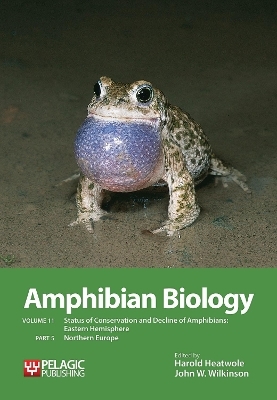
Amphibian Biology, Volume 11, Part 5
Pelagic Publishing (Verlag)
978-1-78427-016-2 (ISBN)
Amphibian species around the world are unusually vulnerable to a variety of threats, by no means all of which are properly understood. Volume 11 in this major series is published in parts devoted to the causes of amphibian decline and to conservation measures in regions of the world. This volume, Part 5 in the series, is concerned with Northern Europe (Luxembourg, Germany, Poland, Switzerland, Austria, Czech Republic, Slovakia, Norway, Sweden, Finland, Estonia, Latvia, Lithuania, Denmark).
Each chapter has been written by experts from each country, describing the ecological background and the conservation status of affected species, with an emphasis on native species. As well as infectious diseases and parasites, threats take the form of introduced and invasive species, pollution, destruction and alteration of habitat, and climatic change. These are discussed as they affect each species. All these countries have monitoring schemes and conservation programs, whose origins and activities are described. Recommendations for action are also made.
Edited by leading scholars in the field, Volume 11, when complete, will provide a definitive survey of the amphibian predicament and a stimulus to further research with the objective of arresting the global decline of an entire class of animal.
Harold Heatwole is an ecologist and herpetologist. His first PhD University of Michigan) dealt with habitat use by amphibians, but then he branched out and studied other taxa, mostly reptiles and amphibians, but also ants, tardigrades, and seabirds. He earned a second PhD in Botany with a dissertation on the dynamics of vegetation on coral cays on the Great Barrier Reef of Australia (University of Queensland). He completed his education with a PhD in Geography (James Cook University) and a DsC (University of New England, Australia). He had faculty appointments at the University of Puerto Rico, University of New England, and currently is Professor of Biology at North Carolina State University and Adjunct Professor of Zoology at the University of New England. He is editor in Chief of the journal Integrative and Comparative Biology. He is a Fellow of the Explorers Club. John W. Wilkinson is a conservation biologist specializing in studying and monitoring amphibians and reptiles. He started working with herpetofauna whilst an undergraduate and now nobody will give him a proper job. For eight years he was International Coordinator of the Declining Amphibian Populations Task Force and is currently Science Program Manager for the charity Amphibian and Reptile Conservation. John's PhD thesis was on toad conservation – it just made him realize how much more there is to find out...
Luxembourg
Laura R. Wood, Edmée Engel, Richard A. Griffiths, Roland Proess and Laurent Schley
Germany
Richard Podloucky and Andreas Nöllert
Poland
Maciej Pabijan and Maria Ogielska
Switzerland
Benedikt R. Schmidt and Silvia Zumbach
Austria
Marc Sztatecsny
Czech Republic
Lenka Jeřábková, Martin Šandera and Vojtech Baláž
Slovakia
Ján Kautman and Peter Mikulíček
Norway
Leif Yngve Gjerde
Sweden
Claes Andrén
Finland
Ville Vuorio and Jarmo Saarikivi
Estonia
Riinu Rannap
Latvia
Aija Pupina, Mihails Pupins, Andris Ceirans and Agnese Pupina
Lithuania
Giedrus Trakimas, Jolanta Rimšaitė and John W. Wilkinson
Denmark
Kåre Fog, Lars Christian Adrados, Andreas Andersen, Lars Briggs, Per Klit Christensen, Niels Damm, Finn Hansen, Martin Hesselsøe and Uffe Mikkelsen
| Erscheinungsdatum | 10.05.2021 |
|---|---|
| Reihe/Serie | Amphibian Biology |
| Zusatzinfo | Figures; Illustrations, color |
| Verlagsort | Exeter |
| Sprache | englisch |
| Maße | 170 x 244 mm |
| Gewicht | 360 g |
| Themenwelt | Sachbuch/Ratgeber ► Natur / Technik ► Naturführer |
| Naturwissenschaften ► Biologie ► Ökologie / Naturschutz | |
| Naturwissenschaften ► Biologie ► Zoologie | |
| ISBN-10 | 1-78427-016-4 / 1784270164 |
| ISBN-13 | 978-1-78427-016-2 / 9781784270162 |
| Zustand | Neuware |
| Haben Sie eine Frage zum Produkt? |
aus dem Bereich


